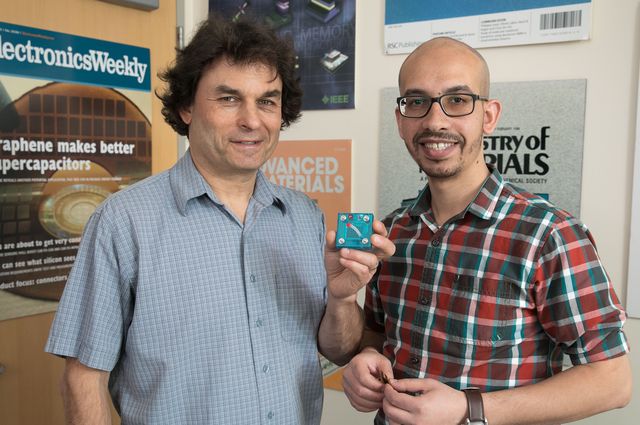UCLA researchers Richard Kaner and Maher El-Kady, “Have designed a device that can use solar energy to inexpensively and efficiently create and store energy, which could be used to power electronic devices, and to create hydrogen fuel for eco-friendly cars.” Kaner and El-Kady have devised many low-budget approaches to capturing and exploiting energy, such as their method of “burning” supercapacitors on a personal computer DVD. Their newest accomplishment, according to Kaner, “Could dramatically lower the cost of hydrogen cars.” It would be useful in urban or rural areas, or even on remote battlefields, giving users the ability to make both electricity and fuel from the same device. In cities, it could store surplus energy from electrical grids, and in more remote locations, allow energy generation and fuel creation “off the grid.” The pair’s replica of the device looks like a designer electronic gizmo encased in a turquoise plastic case. It uses inexpensive, abundant elements like nickel, iron and cobalt to …
What Do You Have on Your DVD Burner?
Richard Kaner and Maher El-Kady have “micro-scale graphene-based supercapacitors” on their front DVD burner, showing an energetic alternative to saving all those ‘80’s rockers to disc. Dr. Kaner is a member of the California NanoSystems Institute at the University of California at Los Angeles (UCLA) and professor of chemistry and biochemistry. He and graduate student El-Kady are using a “consumer grade” LightScribe DVD burner to make dozens of micro supercapacitors on what looks like a typical DVD. Dr. Kaner’s research lab hosts 17 undergraduate and graduate student researchers who’ve helped amass at least 390 papers in four main areas of research; conducting polymers, graphene, superhard materials and thermoelectric materials. Their recent investigation of supercapacitor fabrication seems to encompass almost all of these fields. An abstract for their recent article in Nature Communications hints at the possibilities this research may realize in the commercial world. “The rapid development of miniaturized electronic devices has increased the demand for compact on-chip energy storage. …

